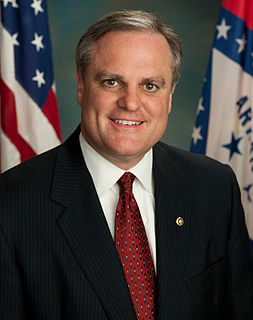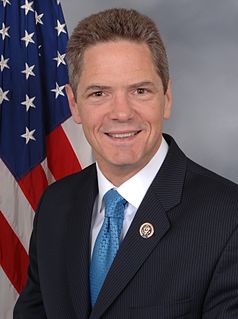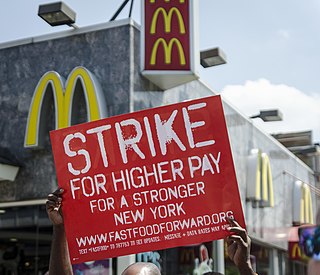
Mary Loretta Landrieu is an American politician, entrepreneur, and former U.S. Senator for the state of Louisiana. She is a member of the Democratic Party.

Mark Lunsford Pryor is an American attorney, politician and lobbyist who served as a United States Senator from Arkansas from 2003 to 2015. He is a member of the Democratic Party. Prior to becoming senator, he was Attorney General of Arkansas from 1999 to 2003.

The Congressional Progressive Caucus (CPC) is a congressional caucus affiliated with the Democratic Party in the United States Congress. The CPC represents the most left-leaning faction of the Democratic Party. It was founded in 1991 and has grown since then.

The National Restaurant Association is a restaurant industry business association in the United States, representing more than 380,000 restaurant locations. It also operates the National Restaurant Association Educational Foundation. The association was founded in 1919 and is headquartered in Washington, D.C.

The 100-Hour Plan was a United States Democratic Party political strategy detailing the actions the party pursued upon assuming leadership of the 110th Congress on January 4, 2007. The strategy was announced before the 2006 midterm elections. Speaker Nancy Pelosi pledged that her party would continue to pursue these goals upon her assumption of leadership. The 100-hour time period refers to business hours and not actual time, and has alternately been termed "100 legislative hours"; Pelosi's spokesman Brendan Daly defined the starting point this way: "It's when the House convenes, after the one-minutes and before the special orders."

Mark Hamilton Schauer is an American politician who served as a U.S. representative for Michigan's 7th congressional district from 2009 to 2011.

The minimum wage in the United States of America is set by U.S. labor law and a range of state and local laws. The first federal minimum wage was instituted in the National Industrial Recovery Act of 1933, signed into law by President Franklin D. Roosevelt, but later found to be unconstitutional. In 1938 the Fair Labor Standards Act established it at $0.25 an hour. Its purchasing power peaked in 1968, at $1.60. Since 2009, it has been $7.25 per hour.
The New York State Department of Labor is the department of the New York state government that enforces labor law and administers unemployment benefits.

The Fair Labor Standards Act of 1938 29 U.S.C. § 203 (FLSA) is a United States labor law that creates the right to a minimum wage, and "time-and-a-half" overtime pay when people work over forty hours a week. It also prohibits employment of minors in "oppressive child labor". It applies to employees engaged in interstate commerce or employed by an enterprise engaged in commerce or in the production of goods for commerce, unless the employer can claim an exemption from coverage. The Act was enacted by the 75th Congress and signed into law by President Franklin D. Roosevelt in 1938.
Ballot Measure 25 of 2002 increased Oregon's minimum wage from $6.50 to $6.90 per hour and required an annual increase to compensate for inflation in future years. Inflation is measured by the consumer price index. As of 2015, the minimum wage in Oregon is $9.25 an hour. The measure was approved in the November 5, 2002 general election with 645,016 votes in favor, 611,658 votes against.Itemized Measure Listings, Measure 25 page 17 The measure was placed on the ballot as a result of initiative petition.

The Paycheck Fairness Act is a proposed United States labor law that would add procedural protections to the Equal Pay Act of 1963 and the Fair Labor Standards Act as part of an effort to address the gender pay gap in the United States. A Census Bureau report published in 2008 stated that women's median annual earnings were 77.5% of men's earnings. Recently this has narrowed, as by 2018, this was estimated to have decreased to women earning 80-85% of men's earnings. One study suggests that when the data is controlled for certain variables, the residual gap is around 5-7%; the same study concludes that the residual is because "hours of work in many occupations are worth more when given at particular moments and when the hours are more continuous. That is, in many occupations, earnings have a nonlinear relationship with respect to hours."

The Stop Tobacco Smuggling in the Territories Act of 2013 was a bill introduced into the United States House of Representatives in the 113th United States Congress that passed the House with a vote of 421-5. The purpose of the bill is to redefine "state" in the Contraband Cigarette Trafficking Act of 1978 to add American Samoa, the Commonwealth of the Northern Mariana Islands, and Guam, so that United States laws against tobacco smuggling would apply in those places. The 1978 Act makes it a felony to smuggle cigarettes from one area to another without paying the appropriate taxes. Smugglers trafficking in cigarettes transport cigarettes to jurisdictions with high cigarette taxes, avoid paying the taxes, and then sell the smuggled cigarettes with a large profit margin, while still selling their cigarettes for a cheaper price than those that could be purchased legally.

The bill S. 256, long title "To amend Public Law 93–435 with respect to the Northern Mariana Islands, providing parity with Guam, the Virgin Islands, and American Samoa," is a bill that was introduced into the 113th United States Congress. S. 256 would convey to the government of the Commonwealth of the Northern Mariana Islands (CNMI) submerged lands surrounding such Islands and extending three geographical miles outward from their coastlines. It would also include the Commonwealth of the Northern Mariana Islands among the islands where the President may establish naval defensive sea areas and airspace reservations when necessary for national defense. Finally, it would amend the Fair Minimum Wage Act to provide for no Commonwealth of the Northern Mariana Islands minimum wage increases in 2013 and 2015.

The Fight for $15 is an American political movement advocating for the minimum wage to be raised to USD$15 per hour. The federal minimum wage was last set at $7.25 per hour in 2009. The movement has involved strikes by child care, home healthcare, airport, gas station, convenience store, and fast food workers for increased wages and the right to form a labor union. The "Fight for $15" movement started in 2012, in response to workers' inability to cover their costs on such a low salary, as well as the stressful work conditions of many of the service jobs which pay the minimum wage.

The Minimum Wage Fairness Act is a bill that would amend the Fair Labor Standards Act of 1938 (FLSA) to increase the federal minimum wage for employees to $10.10 per hour over the course of a two-year period. The bill was strongly supported by President Barack Obama and many of the Democratic Senators, but strongly opposed by Republicans in the Senate and House.

The Omnibus Territories Act of 2013 is a bill that amend laws concerning the territories of American Samoa, Guam, the U.S. Virgin Islands, and the Commonwealth of the Northern Mariana Islands. The bill would increase the size of the territory of the Northern Mariana Islands, start an energy plan for the areas, and expand turtle conservation efforts.

Maine Question 4, formally An Act to Raise the Minimum Wage, is a citizen-initiated referendum question that appeared on the Maine November 8, 2016 statewide ballot. It sought to increase Maine's minimum wage from $7.50 per hour to $12 an hour by 2020, as well as increasing the minimum wage for tipped employees gradually to the same level by 2024. It would also index increases after 2024 to inflation. As the Maine Legislature and Governor Paul LePage declined to enact the proposal as written, it appeared on the ballot along with elections for President of the United States, Maine's two U.S. House seats, the Legislature, other statewide ballot questions, and various local elections. Efforts to place a competing, more moderate proposal alongside the citizen-initiated bill were unsuccessful.

The American Rescue Plan Act of 2021, also called the COVID-19 Stimulus Package or American Rescue Plan, is a US$1.9 trillion economic stimulus bill passed by the 117th United States Congress and signed into law by President Joe Biden on March 11, 2021, to speed up the country's recovery from the economic and health effects of the COVID-19 pandemic and the ongoing recession. First proposed on January 14, 2021, the package builds upon many of the measures in the CARES Act from March 2020 and in the Consolidated Appropriations Act, 2021, from December.

The Raise the Wage Act is a proposed United States law that would increase the federal minimum wage to US$15. It has been introduced in each United States Congress since 2017.










